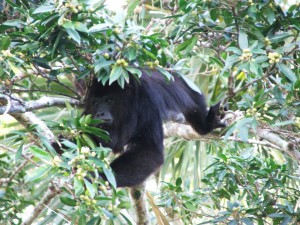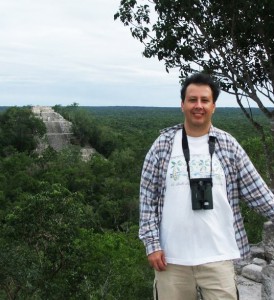Today, it is with great pleasure that we announce the launch of PEN's Voices from the Field audio interview series! This series will provide a platform for primate educators around the globe to share their insights and lessons learned through inspiring stories. Listen to our first interview by Dr. Juan Carlos Serio Silva, PEN's Regional Coordinator for Mexico, below.
Can you please tell our listeners your name, title, and affiliation?
My name is Juan Carlos Serio Silva and I am a Professor and Researcher at the Institute of Ecology. I am also PEN's Regional Coordinator for Mexico.
What inspired you to become a primate educator?
For many years, almost all of the primate researchers that I encountered did not devote any time to teach others about the value of wild primates. This was only natural during those previous years because many of my friends (including me) were trained only to gather and analyze all scientific information obtained from the field. We assumed that with our high impact papers published in the best journals that we were providing all the tools necessary to save wild monkeys and their natural habitats. The truth was the absolute opposite. For example, in a missed database named "Primate Lit," there were less than 500 contributions about education, between papers and abstracts, published from 1940 to 2010 in comparison to thousands of papers related with many other topics on primates.
So, with this poor impact and interest from our contributions in primatology, I increased my focus to include training local people and teaching anyone who could play a role in caring for wild monkeys and their habitats. I taught about how this relationship is linked with a healthy environment, resulting in helping local people to live better. Of course, as a professor I am always writing scientific papers, but I have incorporated education as part of my primate conservation efforts and I encourage my students to work with people in rural and urban environments to teach them about the value of primates and their tropical rainforest habitats for them and for the world.
Can you describe one challenge you encountered and overcame as a primate educator?

Can you share a personal story to support how education influences or results in primate conservation?
During the last few years, we have been working in the Tabasco state in a very fragmented area in southern Mexico. In this area, we are studying the behavioral flexibility of monkeys at our study sites and we evaluate how they are adapting to these unfortunate new conditions. During our daily actions, we work with local people and with many children that many times make the best field guides. They help us to find the monkeys and study them more easily. We spend many hours talking about the importance of these and other animals and in the last years we were very surprised to see our efforts pay off, as their attitudes and behavior changed. Now they protect and preserve many of their forest fragments. Currently, we are establishing several corridors with trees planted by local people that will connect these fragmented forests. Besides this, we visit local schools and deliver games and activities for children where they can learn about primates and the importance of preserving nature. I am sure that like me, my students find these activities as one of the most wonderful rewards during their primate studies. In some sense, we are giving a voice to monkeys about their needs and the local people are lending their ears to listen to this voice.
Thank you for listening! We welcome and encourage you to leave a comment, share this post, and help us spread the word.








